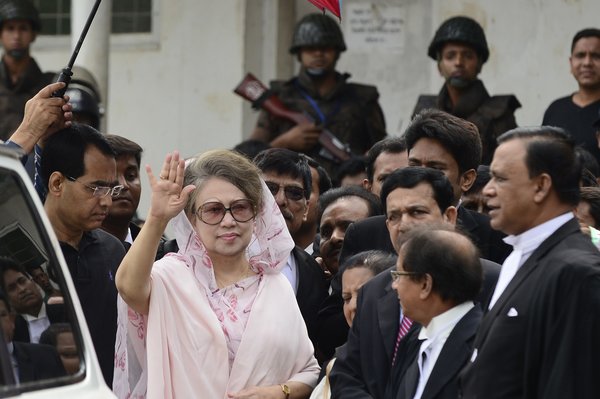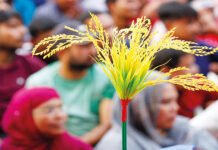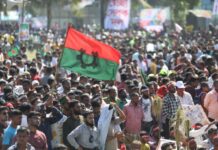A jittery silence has fallen over the street where Salahuddin Ahmed, a top official of the opposition Bangladesh Nationalist Party, is believed to have been abducted a month ago.
The caretaker who opened the compound gate to a group of men, and told several journalists they identified themselves as police detectives, can no longer be found, friends on the street say. Neither can the maid who opened the door to the apartment. The owner of the apartment, the deputy managing director of a bank, is also unreachable.
“Of course something happened, but each and every one prefers to be silent,” said Mozammel, a guard at the building next door. A man who emerged from the building urged reporters to stop asking about Mr. Ahmed, which he said put the neighbors in danger. “Everyone is fear,” he said in broken English, refusing to give his name. “You, also, are being observed at this moment.”
Over the last week, Bangladesh’s two main political leaders have edged back from the confrontation that paralyzed the country starting in January, when the opposition leader Khaleda Zia began a campaign of political strikes and transport blockades, hoping to force her rival, Prime Minister Sheikh Hasina, to call new national elections. Since then, more than 100 people have been killed in firebombings, and dozens of B.N.P. officials and activists arrested.
The tension seemed to abate Sunday, when Mrs. Zia, the head of the B.N.P., surrendered to a court in two graft cases, something she had refused to do. The court then granted Mrs. Zia bail rather than ordering her arrest. Mrs. Zia has instructed candidates from her party to compete in city elections in late April, evidently acknowledging that the protest has run its course.
But it will not be easy or straightforward to exit the crisis. One reason is Mr. Ahmed’s disappearance on March 10, which his family members, and party leaders, say they are certain was carried out by security forces.
For years, domestic and international rights organizations have documented abductions and extrajudicial killings and torture by Bangladeshi security forces, including the Rapid Action Battalion, an elite counterterrorism squad that receives training in internal disciplinary protocol from the United States.
The disappearance of Mr. Ahmed, who had a high-profile role as party spokesman, has been unsettling for many, said Mahfuz Anam, the editor of The Daily Star, a newspaper based here.
“The state of the matter is that he has disappeared, and nobody is taking responsibility,” he said. “To me, this is a very fearful situation. Anybody can be picked up in the dead of night, and then the government can say, ‘We have no idea.’ ”
Several witnesses told journalists that law enforcement officers were present on the street where Mr. Ahmed was staying, but the most important witnesses — including the caretaker, Akhter Ali — subsequently fell out of contact or gave contradictory evidence.
Two people present on the street that night, speaking on the condition of anonymity, said that they had seen three or four vehicles, including one from the Rapid Action Battalion, parked in front of the house. Rebeka Sultana, whose husband was Mr. Ahmed’s driver, said her husband was detained in the predawn hours by armed men in civilian clothes two days before Mr. Ahmed disappeared, then jailed in a nearby police station. The driver remains in custody.
“We are not sure he was taken by anybody,” said Monirul Islam, joint commissioner in Dhaka’s detective and criminal intelligence division. “Nobody heard any noise when he was taken, or left that place. Nobody knows that Salahuddin was there.”
When police officers have approached witnesses for information about Mr. Ahmed, he said, “they just decline.”
“Maybe they are afraid of petrol bombs,” he added, suggesting that opposition forces had intimidated witnesses.
Mr. Ahmed’s wife, Hasina Ahmed, a former member of Parliament, said she had questioned the witnesses and was left with no doubt that he had been detained by security forces.
“We want to say he is alive, he is very much alive,” said Moudud Ahmed, another lawyer for the family, at the hearing on Thursday.
Mr. Ahmed’s disappearance took place amid mounting political violence, as dozens of ordinary Bangladeshis were being killed in firebombings, presumably ordered by opposition leaders. Most of the B.N.P.’s senior and midlevel leaders face criminal charges for violations like throwing bombs or vandalizing vehicles. Many — two joint secretaries general, an acting secretary general, a vice chairman and a member of the party’s standing committee, among others — are in jail, according to The Daily Star.
Mr. Ahmed, who served as the deputy communications minister when his party was in power, was a party joint general secretary and took on a sensitive role in January, as spokesman responsible for announcing strikes and blockades. His two immediate predecessors had been arrested, and he went into hiding, moving from house to house and arranging occasional meetings with family, his wife said. His 17-year-old-daughter, Fariba, said she had not seen him for “a few months.”
In April 2013, Elias Ali, a regional secretary of the B.N.P., was reported missing. Hasina Ahmed called for an inquiry, but also suggested that he might have been hiding on party orders. He has never been located.
Last year, Human Rights Watch documented 11 cases that took place around the 2014 election in which opposition leaders or activists were killed under suspicious circumstances after being detained by law enforcement, in many cases by the Rapid Action Battalion. This week, state prosecutors charged three former battalion officials and more than two dozen other former battalion personnel in connection with the April 2014 deaths of seven men in what were apparently contract killings.
Source: NYTimes










